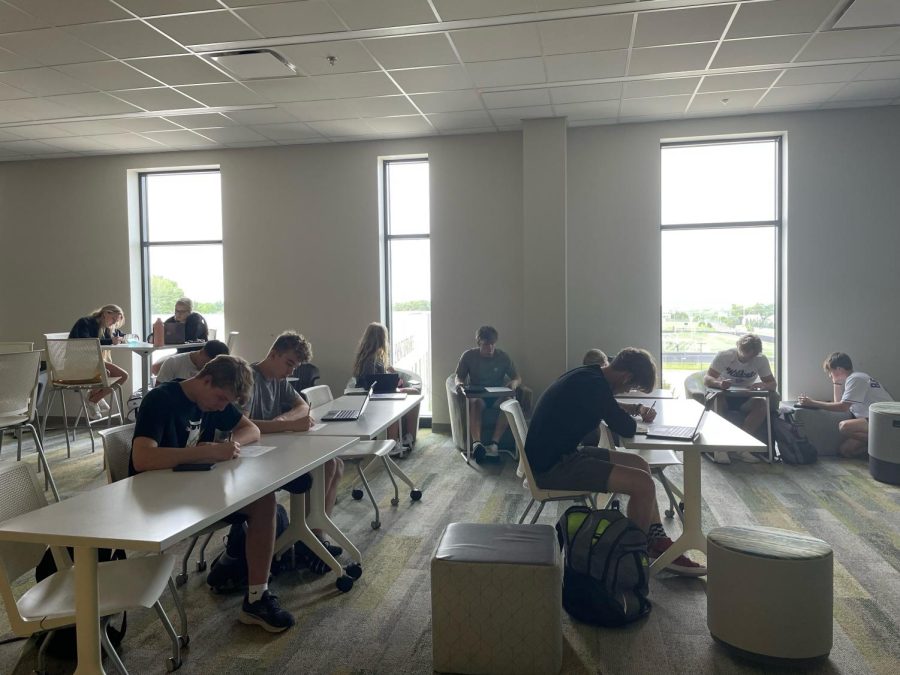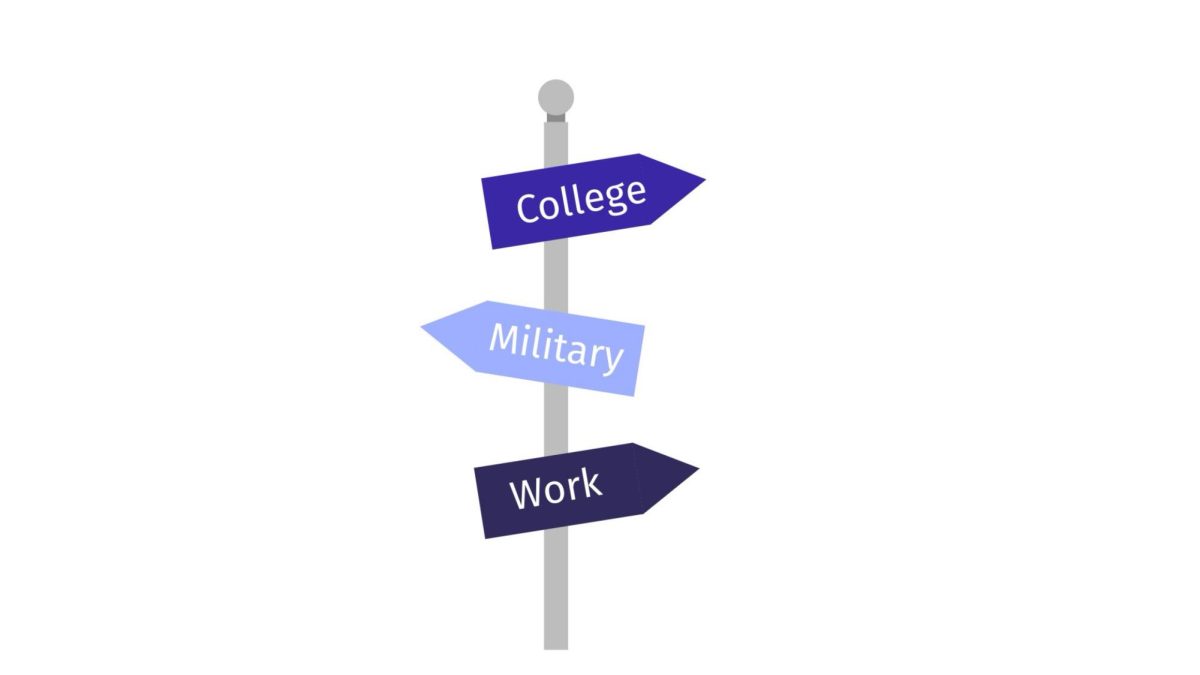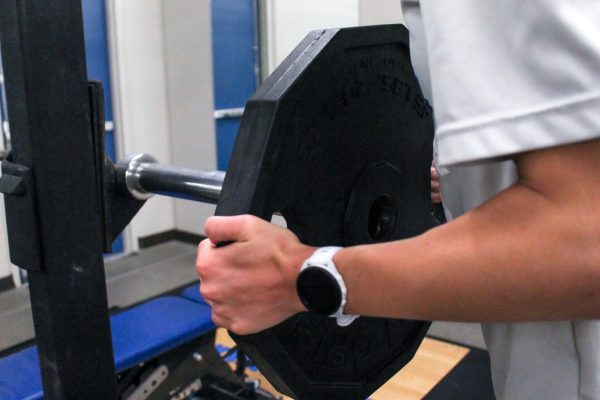AP Classes: What to Expect in a Class Full of Expectations
May 19, 2022
AP classes are an opportunity for students to gain college credit while taking classes in high school. However, the stress of these AP classes corresponds to the advancement of the curriculum.
At Olathe West, there are several AP classes offered. However, the stress of these AP classes corresponds to the advancement of the curriculum.
The core classes offered include AP Chemistry, AP Language and Composition, AP Literature, AP Calculus, AP U.S. History, AP Biology, AP Physics and AP Environmental Science.
English
AP Language and Composition is currently being taught by Aaron Schwartz and Will Schowalter. Next year, freshmen and sophomore English teacher Brady Field will be moving up to teach it as well.
“AP Language and Composition is the honors level English class for juniors,” Schowalter said. “So if you’re not in normal level English you’ll take AP Lang.”
AP Lang reviews topics such as writing arguments and writing rhetorical analysis.
“We spend a lot of first semester learning what rhetoric is,” Schowalter said. “What persuasive writing looks like and how to analyze it, and in the second semester we spend a lot of time practicing writing argument essays.”
The homework load for AP Lang is a seemingly average amount for an AP class, not excessive but not none.
“I don’t think it’s too bad,” Schowalter said. “First semester, your homework is usually like reading and annotating a piece of reading.”
However in regards to work before the class, that is where it can differ from other normal classes.
“There’s a pretty big summer assignment,” Schowalter said. “And I do that for two reasons. One, it’s a little practice of all the stuff you’ll do in this class so you can get a taste for it. And two, because I like to scare away the lazy students.”
AP Lang is a class designed for specific students, deciding to take it depends on who the student is.
“Don’t take this class if you’re not planning on going to college,” Schowalter said. “Take this class if you enjoy writing and enjoy doing a lot of writing.”
Compared to the other AP core classes, AP Lang is considered one of the easier courses, but one to be taken seriously.
Math
Another option given in junior year is AP Calculus, taught by Patrick Flynn and Phyllis Clark.
“It’s Calculus one and two in college,” Flynn said. “So it’s like your first two semesters of math classes.”
AP Calculus is a class that is as challenging as it sounds, with it being an advanced college-level math class.
“It’s probably the first class a student will find challenging,” Flynn said. “If they’re very good at math. Sometimes the questions will take a couple hours to figure out. We’re integrating all the math they’ve learned from all of school.”
Like the other AP classes, you can gain college credit from taking AP Calculus.
“You can get 10 hours of college credit,” Flynn said. “You’re also in a smaller class then you would be in college. In college this class is typically 50-100 students. Even if you’re not going to use math when you get out of school, it really teaches you how to think very well.”
Even though it’s a challenging class, Flynn has good expectations for the new students.
“I am proud of you from the moment you come walking through the door,” Flynn said. “And there is nothing you could do to disappoint me.”
Social Studies
Like AP Calculus, AP United States History is another challenging but rewarding class, taught by Jordan Boyd.
“Student’s should expect to do a pretty good chunk of reading and note taking outside of class,” Boyd said. “I provide chapter outlines, I record my own audiobook, and I provide review questions and answers to support every chapter.”
AP United States History focuses on the history of the United States, which differs from AP European History offered to sophomores.
“AP U.S. History is very inclusive,” Boyd said. “We start with pre-Colombian society, so native American history and go all the way through Obama. So it’s a really good course for students who want to learn about more than just the industrial age to the present which is what the regular US History covers.”
Despite the faster pace of AP, the class is still able to go in depth into each topic they go over.
“Homework depends on how quick a reader you are,” Boyd said. “And if you have experience with note taking outside of class. Generally one to two hours a week is reasonable for reading the chapter and taking some notes.”
Like AP Lang, AP U.S. History has a summer assignment before the year kicks off. The class also has a history day competition.
“Students can also start thinking about history day,” Boyd said. “They’ll release the theme for history day at the end of May or beginning of June, and all students who take AP U.S. History are required to do a history day project.”
The class is challenging, but rewarding and a great experience for those who want to immerse themselves in history.
“I’m so excited they’ve chosen to take APUSH,” Boyd said. “It’s a rewarding course and it’s difficult but absolutely worth it. Not just for an exam score or college credit but just for being an well rounded and prepared US citizen.”
Science
There are a few AP options for science courses. AP Environmental Science differs from typical science courses, focusing on the environment.
“AP Environmental Science is a college-level introductory course that examines ecosystems, human impacts on ecosystems, and solutions to protect these ecosystems,” teacher Emily Meyers said. “You also get a t-shirt for completing the class!”
Taking a more unique course can bring benefits, especially if students are looking into a career involving environmental science.
“The benefits of this class include being better prepared for college after persevering through a challenging course,” Meyers said. “Gaining knowledge about a very wide variety of ecosystem topics, practicing lab skills–we perform over 20 labs! We learn about so many different topics, so something in this course will be relevant to your future career.”
Topics covered in this course include earth science, human population growth, weather, agriculture, ecosystems, mining, conservation, energy, pollution and climate change.
Homework is every night, generally about 15-30 minutes, which is generally reasonable for an advanced class.
“This class will be tough,” Meyers said. “But we’ll have fun and learn a lot of practical things about our world.”
AP Physics is taught by Mr. Keiter, a class that focuses on the other aspects of science.
“It’s the most fun of all sciences,” Keiter said. “Lot’s of math, lots of problem solving.”
AP Physics is a class that helps students prepare for college and gives them experience going into college science.
“We’re doing sound waves,” Keiter said. “Nuclear physics, electricity, momentum and circuits.”
Although challenging, Keiter believes the class is a good experience and can benefit the students involved.
“Come in with as good as an attitude as you can,” Keiter said. “Physics is hard enough, I try to keep the atmosphere very light.”
AP Physics does not have a summer assignment.
“I understand with English they have to do it,” Keiter said. “But don’t do it, enjoy your time, we’ll do it when we come back.”
Keiter doesn’t assign more than 15 minutes of homework a night for AP Physics.
One of the last science options is AP Biology, a class that currently doesn’t have a teacher lined up for next year, as it is being taught by a long term sub this year.
“It’s fun, but also very challenging,” long term sub Natalie Kerr said. “Overall it’s a really fun class and students that want to take it just have to put in the work and the effort.”
Benefits include college credit and knowledge of topics students that are interested in biology can gain before college.
“I would tell students to have fun,” Kerr said. “Work hard, and just enjoy the class and try to learn as much as possible.”
There isn’t much homework in AP Biology currently, however when the new teacher is brought in next year that may change.
Finally, one of the more challenging classes, AP Chemistry. AP Chemistry is taught by Dr. Praveen Vadapally, who also teaches Honors Chemistry to sophomores.
Occasionally students are allowed to take home certain projects and homework.
“It also provides an opportunity to score up to 10 hours of college,” Vadapally said. “Depending on what score you get.”
The class is quite beneficial to those who want to major in STEM, and are interested in Chemistry.
“Next year there will be a summer assignment,” Vadapally said. “Someone recommended that I do one.”
The benefits of the class can outweigh the stress of an AP for some students.
“This class will definitely help develop skills for the future,” student Sophie Schneider said. “Put in the work outside of class or you might fall behind. If you keep up with the work, read your notes, and ask as many questions as you can this class can be very enjoyable and you can set yourself up for success.”
Even though the class is tough, students had positive experiences as well as things to say about their “Dr. V.”








